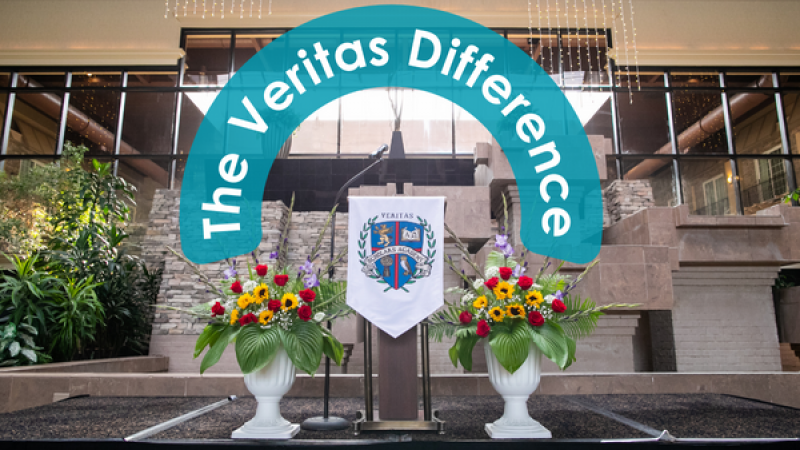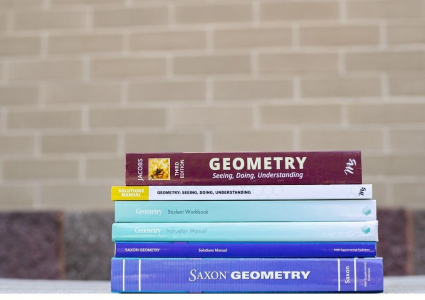The Veritas Difference

I was excited when Veritas Press asked me to write this post. I love history, and my undergraduate degree is in history, so I wanted this topic because it beckons us to look back on why Veritas Press made the curricular choices it made and why some of those early commitments had a substantial and positive impact on many students and classical Christian education.
The “Veritas Difference” is the result of the right question, the right decider, the right spirit, the right path, and the courage to make these decisions.
The Right Question
The most significant difference happens when good things and good people are brought together at the beginning of an effort. This is true of classical Christian education’s foundation with people like Doug Wilson, Tom Garfield, Tom Spencer, and Marlin Detweiler (the four men who created the Association of Classical Christian Schools).
The decisions that happened initially at Veritas Press were also consequential. In the beginning, there was the Press. This is not true, but it is not far from true. Logos was starting to produce materials, and I believe that Memoria Press was also beginning to have offerings, but there was not much curriculum for classical Christian schools. At this point, Veritas Press asked a question. In the end, that question made a massive difference. Here are a few questions that were not asked:
How can we beat the competition (i.e., other curriculum providers)?
How can we produce students that would be accepted by the Ivy League?
How can students be better educated than their public school peers?
How can we produce students who will take over the culture for Christ?
All good questions, and, of course, we did want kids to get jobs, go to college, and impact the culture for Christ, but those good questions were not the questions that were chosen as a focus.
The question we chose was:
What have students been able to do historically?
Instead of looking at the current, dismal state of affairs, we were consistently looking backward at what students had done in ancient Greece and Rome, in the Middle Ages, in the Renaissance and Reformation schools, and in early America. We were not trying to win a race; we were being discipled by a standard—a very lofty standard. In the end, this one decision ended up being foundational to the “Veritas Difference ''.
The Right Decider
The historical standard of what students have been able to achieve was the right goal, but that goal was only as good as the person on the ground making the curricular decisions. The person that brought that standard to life was Laurie Detweiler. To reach the standard, she knew that she had to pick a useful curriculum, but that pressed students to be “disciplined” by standard toward reaching historical excellence.
Laurie had the wisdom, courage, and taste to make these choices. I was watching it and helping where I could, but she was the main “decider.” She was the sine qua non of the Veritas Difference. (That means “without which not”—i.e., without her, it just wouldn’t have come together.)
The Right Spirit
Good standards and good curricular decisions often end up trapped in an academic ivory tower. Dorothy Sayers essay suffered this fate for many years. When Laurie started applying the “what have students been able to do?” standard faithfully, she made another great decision, and then Marlin’s skills as a business leader and salesman made the Veritas Difference an impactful reality.
Laurie captured the right spirit in her choices. She could have chosen a spirit of elitism (i.e., being excellent to lord it over others); she could have chosen a spirit of breaking down students with such piles of work to overwhelm them, humiliate them, and provide an obstacle that perhaps the stoutest would have worked to overcome. She did not. She chose a spirit of historically-informed love and wonder. We chose teachers who could make the lesson and the subject fascinating. We told our teachers that our work was not done until these students loved what they were learning. This sentiment came to dominate the classical Christian landscape and made a giant positive difference.
With the foundations settled, still, there were massive obstacles between good foundational decisions and a “Veritas Difference '' that would make a difference in the lives of students and families across the country and around the world. This curriculum needed an evangelist. Marlin was that evangelist. Using his business acumen and sales skills and marrying those to Laurie’s curricular wisdom and Ned Bustard’s artistic genius. The VP catalog and curriculum were a ray of light when there was not much classical Christian light out there. The early VP catalogs, with their substantive look, sweet spirit, and curricular gold, were critical growth factors for the classical Chrisitan movement.
The Right Path
Early in the adventure, however, we had to make a crucial decision. This decision was necessitated by the fact that we loved the curriculum too much in secondary school. We wanted to have the best textbooks, but we were committed as well to reading primary sources. This led to a lot of student overload, parental anger, and concern at Veritas. Thankfully, after calling in several experts and listening to them, we chose the right path. I am not sure who tells the story, but someone said that the Monday after our big symposium on secondary school, I was at my desk. It looked as if I had shoved everything off my desk into the trash can, and I was scribbling down a list of books. Eventually, that list would be called the Omnibus curriculum. The curricular piece is at the foundation of Veritas Press’s secondary offerings. Again, this decision went back to the right question; it had the right deciders; it was born of the right spirit. We had found the right path.
Courage
Looking back on these decisions that made what I am calling the “Veritas Difference”, I don’t think that any of us felt that the decisions being made were courageous. I just think that we believed that they were right. Looking back, however, it is hard to think of them as anything other than courageous. This path was forged well before Covid when classical Christian education was in its infancy. The decisions were great risks of time, money, and effort. They entailed long nights and Saturday work. Back then, it was just something that had to be done. Now, I see the impact that God had through the questions that we asked and everything that followed that fateful decision.
The renewal of classical Christian education is a 1000-year project. We are rebuilding a cathedral. There is so much left to do. When, however, something is begun, the first few steps are extremely important. These steps make a big “difference”. I am proud and thankful that God gave me a chance to watch courageous faith in action on so many fronts. I am thankful for the role I played. I am thankful that God aided us as we forged the “Veritas Difference”.






